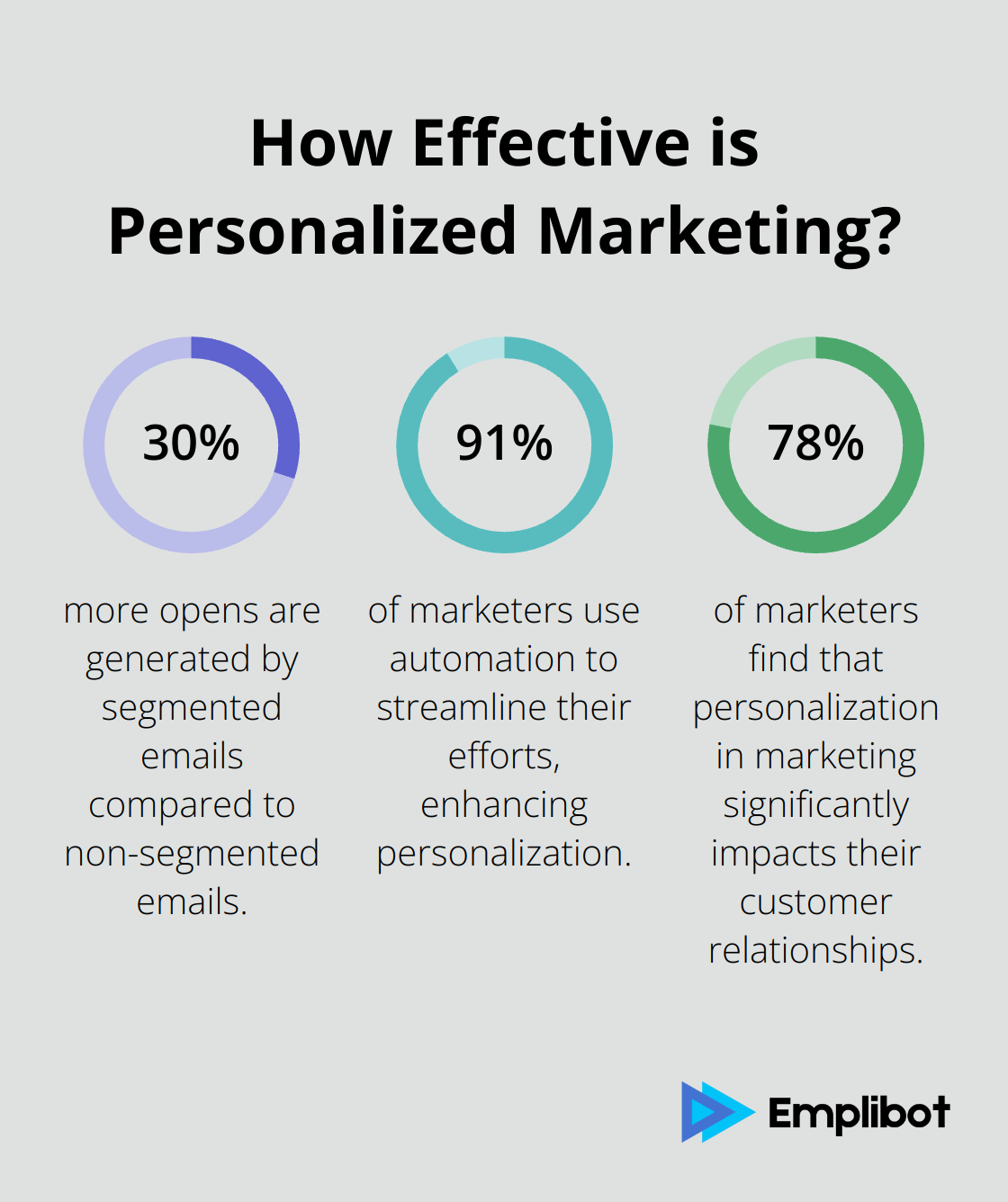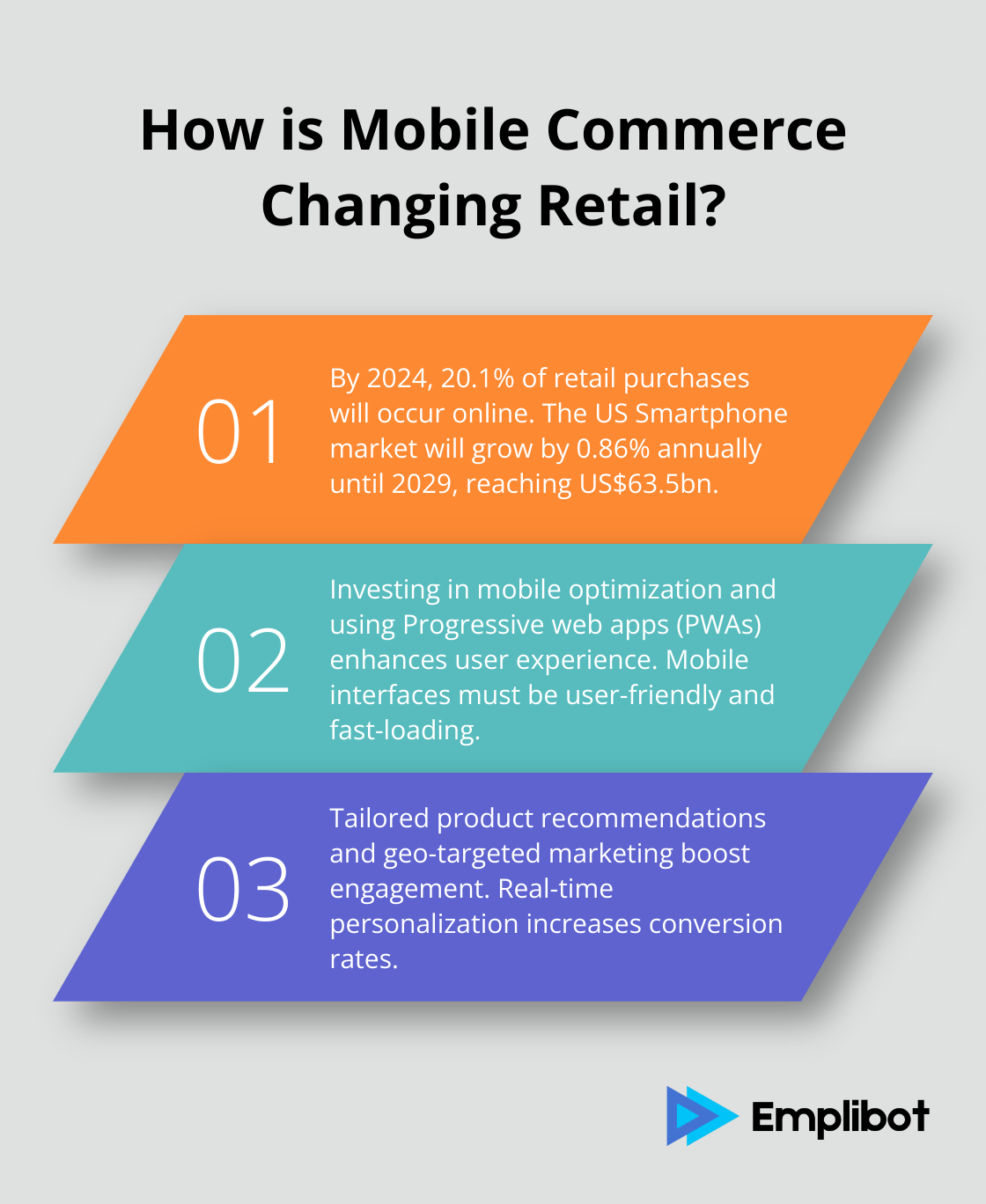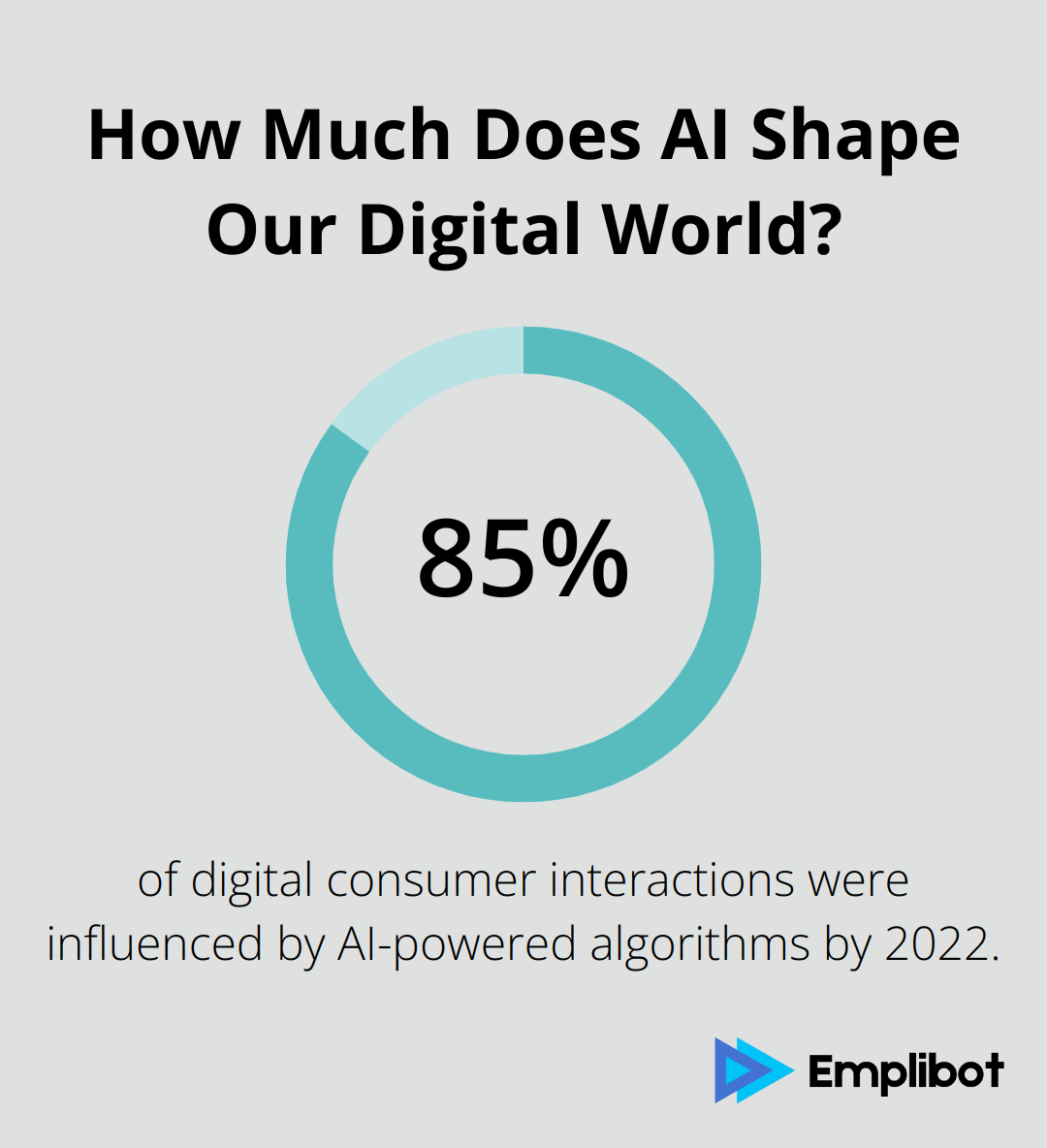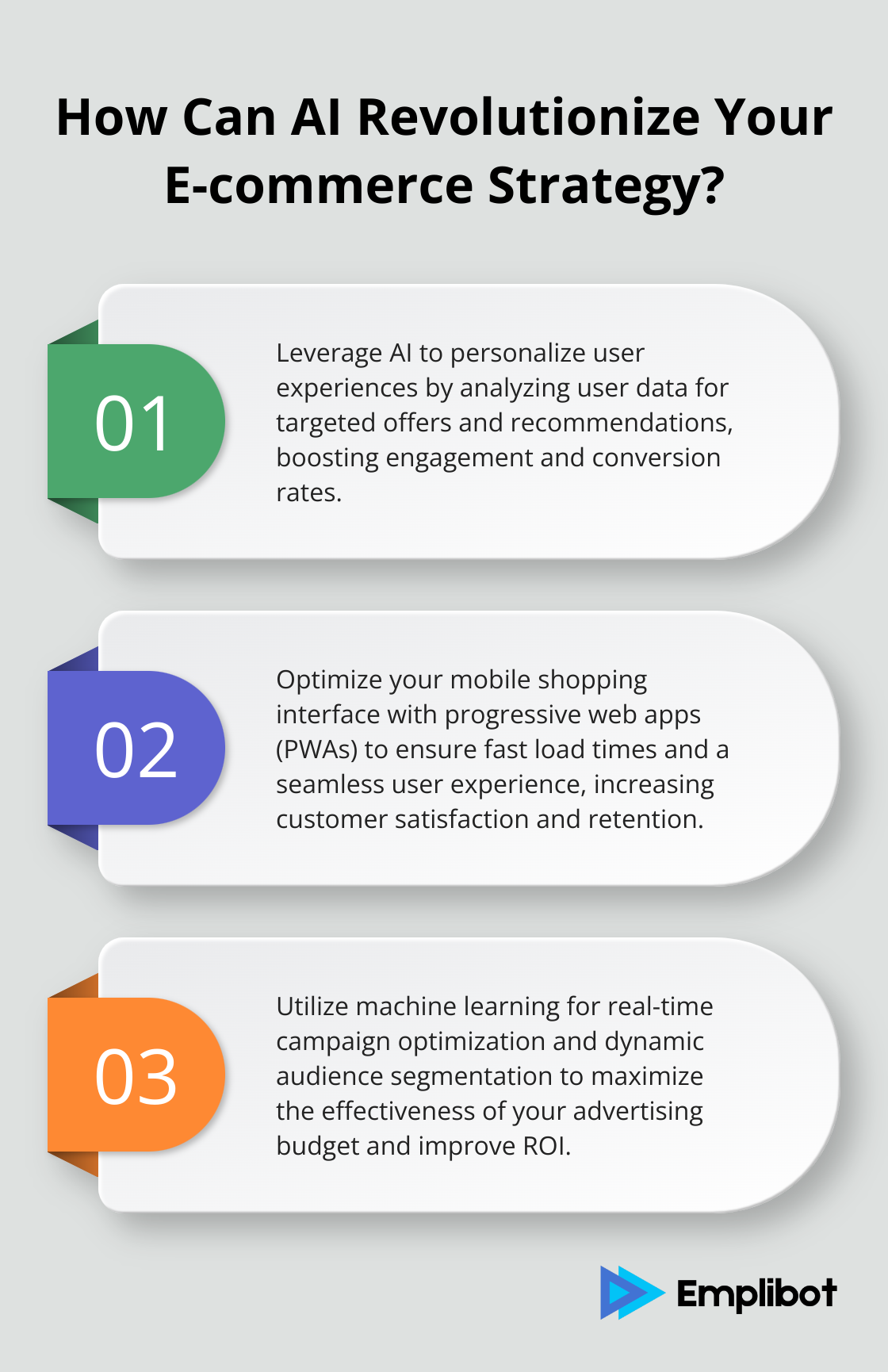Mobile marketing is evolving rapidly, driven by new technologies and changing consumer behaviors.
From personalization to AI and machine learning, several key trends are shaping the landscape for 2024.
We at Emplibot have gathered data and examples to help you understand these trends and apply them effectively.
Stay ahead in the competitive world of mobile marketing by embracing these changes.
Inhalt
ToggleHow Important is Personalization in Mobile Marketing?
The significance of personalized content in mobile marketing cannot be overstated. Personalized experiences lead to higher engagement, better user satisfaction, and increased conversion rates. In 2024, personalization is no longer optional. It’s a necessity for brands aiming to stay relevant and competitive.
The Impact of Personalized Content
Personalized content ensures that users receive messages tailored specifically to their interests and behaviors. According to a study by HubSpot, segmented emails generate 30% more opens and 50% more clickthroughs than non-segmented emails. Additionally, 78% of marketers find that personalization in marketing significantly impacts their customer relationships.
Tools and Techniques for Effective Personalization
To achieve effective personalization, leveraging AI and machine learning is essential. AI-driven algorithms can analyze user data, predict preferences, and deliver highly relevant content. Tools like CRM integrations and marketing automation platforms play a crucial role. Salesforce reports that 91% of marketers use automation to streamline their efforts, reflecting how automation enhances personalization.

Mobile app personalization is another powerful technique. Data from Data.ai shows a continued rise in mobile app usage, making personalized in-app experiences critical. Incorporating features like personalized push notifications and in-app messages can substantially boost user engagement. For example, app inbox notifications allow non-intrusive, yet highly targeted communication, fostering better user interaction.
Success Stories from Industry Leaders
Brands like Starbucks and Nike have demonstrated the power of mobile personalization. Starbucks’ mobile app personalizes offers based on purchase history, resulting in loyal customers who make frequent purchases. Nike’s app and online experiences provide personalized recommendations, which has significantly enhanced user satisfaction and retention.
Similarly, Sephora’s use of augmented reality (AR) for virtual try-ons is another excellent example. By combining personalization with AR, Sephora delivers a unique and tailored shopping experience that has proved to be incredibly effective in increasing customer conversion rates.
In the evolving landscape of mobile marketing, personalization is not just a trend; it’s a proven strategy that drives results. Stay tuned for our next chapter where we’ll explore another critical aspect of mobile marketing for 2024.
Is Mobile Commerce the Future?
Mobile commerce, or mCommerce, is expanding rapidly, defining new norms for modern shopping. As consumers increasingly rely on their smartphones for shopping, the growth statistics and forward projections reveal compelling trends that cannot be ignored.
Rise in Mobile Commerce Usage
By 2024, 20.1% of retail purchases are expected to take place online, and this trend shows no signs of slowing down. The Smartphones market in the United States is projected to grow by 0.86% (2024-2029) resulting in a market volume of US$63.5bn in 2029. This growth is driven by consumer demand for convenience and swift purchasing experiences. By 2024, mobile commerce is expected to dominate retail landscapes, with billions in mobile ad spend reflecting this shift.
Strategies for Thriving in Mobile Commerce
To capitalize on this booming trend, investing in mobile optimization is crucial. Prioritize a seamless, user-friendly mobile interface that simplifies the shopping process. Progressive web apps (PWAs) are a valuable tool, offering an app-like experience within a browser, ensuring faster load times and a consistent user journey.

Leveraging mobile personalization can dramatically enhance the shopping experience. Tailor product recommendations based on user data and browsing history. Integrating real-time personalization can skyrocket user engagement and conversion rates. Geo-targeted marketing tactics can also be a game-changer, delivering personalized offers based on the user’s location.
Leading Examples in Mobile Commerce
Ikea has embraced augmented reality to set a benchmark in mCommerce. Their app allows users to visualize furniture in their home environment before purchasing, driving higher engagement and reducing returns. Similarly, fashion retailer ASOS uses AI-driven personalization to suggest clothing items based on user preferences, which has significantly boosted their sales.
Sephora’s mobile app not only offers AR for virtual try-ons but also sends personalized push notifications and in-app messages, creating an engaging shopping experience. This personalized approach has been pivotal in maintaining their strong customer base.
The data clearly shows that mobile commerce is not just a trend—it’s a transformative force in retail. Adopting these strategies and focusing on personalization can help businesses stay competitive and meet the ever-evolving needs of consumers.
How Will AI and Machine Learning Shape Mobile Marketing in 2024?
Artificial Intelligence (AI) and Machine Learning (ML) are transforming mobile marketing in unprecedented ways. These technologies offer actionable insights, optimize campaigns, and drive successful customer interactions.
AI-Driven Marketing Insights
AI enhances data analysis by turning vast amounts of user data into actionable insights. Leading platforms can evaluate user behavior, preferences, and purchase history to predict future actions. According to Gartner, by 2022, AI-powered algorithms already influenced over 85% of digital consumer interactions. In 2024, this trend will only intensify. AI can recommend the best times to send marketing messages, the most effective content formats, and even the optimal pricing strategies.

For instance, AI aids in sentiment analysis. By analyzing social media interactions, reviews, and feedback, AI can gauge public sentiment toward a brand or product. This insight allows marketers to tailor their strategies accordingly, ensuring that campaigns resonate positively with the audience.
Machine Learning Applications in Campaign Optimization
Machine Learning allows for continuous improvement of marketing campaigns. These systems learn from past data and optimize future campaigns for better performance. For example, ML algorithms can A/B test different versions of an ad campaign in real-time and automatically allocate budgets to the highest-performing versions.
Sophisticated machine learning models can also segment audiences more precisely. HubSpot reports that segmented campaigns receive 14.31% higher open rates and 100.95% higher click-through rates compared to non-segmented ones. Using ML, marketers can create dynamic segments that adjust in real-time based on user behavior, ensuring that every advertising dollar is spent more effectively.
Additionally, machine learning ad bidding can optimize ad performance, crafting smart strategies and best practices to boost ROI. This technology enables real-time adjustments, ensuring ads reach the most relevant audience at the right time.
Case Studies of AI Success in Mobile Marketing
Several brands have already seen substantial success by integrating AI and ML into their mobile marketing strategies. Netflix uses AI-driven personalization to recommend content to users, resulting in higher viewer satisfaction and retention. Similarly, Amazon leverages machine learning for its recommendation engines, predicting what users are likely to buy next, contributing to its $2.7 trillion market cap.
Coca-Cola utilizes AI to analyze consumer behaviors and preferences from various data points, including social media, to craft highly personalized marketing campaigns. This approach has significantly boosted user engagement rates, demonstrating the tangible benefits of employing AI in mobile marketing.
In summary, AI and ML are not just emerging technologies but essential tools driving the future of mobile marketing. By leveraging these technologies, businesses can gain deeper insights, optimize their marketing efforts, and achieve higher user engagement and satisfaction.
Wrapping Up
Mobile marketing in 2024 is characterized by several key trends, including the rise of personalization, the expansion of mobile commerce, and the transformative power of AI and machine learning. Personalized experiences have become essential, driving higher engagement and conversion rates. AI and machine learning offer invaluable insights and optimization opportunities, allowing more effective and tailored marketing strategies.

The future of marketing is undoubtedly mobile-centric. As consumers increasingly engage with brands through their smartphones, businesses must adapt to these trends to remain competitive. Leveraging AI, enhancing personalization, and optimizing for mobile commerce are not just optional strategies—they are imperative for success.
Brands that embrace these trends and continually innovate will not only meet the demands of modern consumers but will also position themselves at the forefront of the industry. By staying agile and attentive to these developments, businesses can ensure sustained growth and relevance in an ever-evolving market landscape.
For those looking to ease their content creation process while optimizing for SEO, Emplibot offers a seamless solution. Emplibot publishes SEO-friendly articles to your WordPress site 100% automatically, including keyword research, images, and internal linking. With Emplibot, businesses can build their blog effortlessly and stay focused on what truly matters—adapting and innovating in their mobile marketing strategies.











